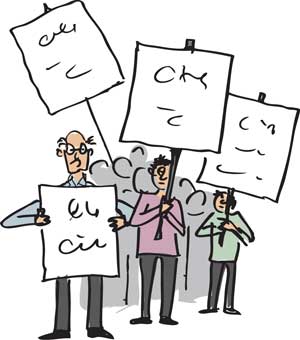Reply To:
Name - Reply Comment
Last Updated : 2024-05-11 03:39:00
Once again on Monday, the Government Medical Officers’ Association (GMOA) launched another 24-hour countrywide strike in public hospitals, causing agony to tens of thousands of poor patients. Claiming to be one of the most powerful trade unions in Asia and using if not abusing that power, during the past few months, the GMOA has been launching strikes in a recklessly regular manner.
 In the old world order of socialism and capitalism, the right to form trade unions was considered part of the democratic process. Strangely, however, in so-called socialist countries such as the Soviet Union (now Russia), China and North Korea, no strikes are allowed and anyone or group threatening a strike faces death or imprisonment. In any event, what we saw and still see in most of these so-called socialist countries is largely state capitalism with the rich and ruling elite enriching themselves at the expense of hundreds of millions of poverty-trapped people, though little or no information is given to the outside world.
In the old world order of socialism and capitalism, the right to form trade unions was considered part of the democratic process. Strangely, however, in so-called socialist countries such as the Soviet Union (now Russia), China and North Korea, no strikes are allowed and anyone or group threatening a strike faces death or imprisonment. In any event, what we saw and still see in most of these so-called socialist countries is largely state capitalism with the rich and ruling elite enriching themselves at the expense of hundreds of millions of poverty-trapped people, though little or no information is given to the outside world.
Whatever happened or did not happen after the Second World War, the information and communication technology revolution during the past 25 years has radically transformed the world order. Whether we like it or not, for better or for worse, modern digital technology’s marvels have created a global village or community with attitudes and approaches changing, despite an outbreak of nationalistic populism in some countries including the United States where the arrogant populist President Donald Trump may face impeachment though he has repeatedly pledged to put America first.
It is in such a context that in the post-2015 Sri Lanka we are seeing regular strikes, threats of strikes and demonstrations mainly by the GMOA and university student unions. They are demanding the closure of the South Asia Institute of Technology and Medicine (SAITM) though the Court of Appeal has ruled that its medical graduates be recognized. The GMOA’s controversial president is facing contempt charges for allegedly ridiculing this court order and calling for strikes.
Whatever the case, many analysts believe the government needs to take tough action to ensure that essential services are not disrupted. Just as strikes are not allowed in the armed services and the Police, there appears to be a need to curb or stop strikes in essential public services such as health, transport, fuel, electricity and water supplies.
Instead of confrontational trade unions, some of which go for strike action not as a last resort but as a regular threat, Sri Lanka might be better off if welfare societies are set up for dialogue between employees and employers. All major religions also teach us that for conflict resolution the best way is dialogue and accommodation on the middle path without resorting to strikes which in a sense amount to an attack on the rights of the people, especially the poor. As we have often stressed before, rights are linked to responsibilities, be it in the family, the workplace or the country. When any union fails in its responsibilities and makes millions of innocent people suffer, then it forfeits its rights.
On the SAITM issue, President Maithripala Sirisena has gone a long way to resolve the conflict in a manner that is just and fair to all, mainly the people. If the President’s soft line, middle path approach is being rejected or abused, then he and the Government need to get tough because now it has gone beyond the matter of enough being enough, and we have had far too many strikes or demonstrations.
dumidudasa athurugriya Thursday, 25 May 2017 03:08 PM
well said

Add comment
Comments will be edited (grammar, spelling and slang) and authorized at the discretion of Daily Mirror online. The website also has the right not to publish selected comments.
Reply To:
Name - Reply Comment
US authorities are currently reviewing the manifest of every cargo aboard MV
On March 26, a couple arriving from Thailand was arrested with 88 live animal
According to villagers from Naula-Moragolla out of 105 families 80 can afford
Is the situation in Sri Lanka so grim that locals harbour hope that they coul
9 hours ago
9 hours ago

10 May 2024
09 May 2024
09 May 2024